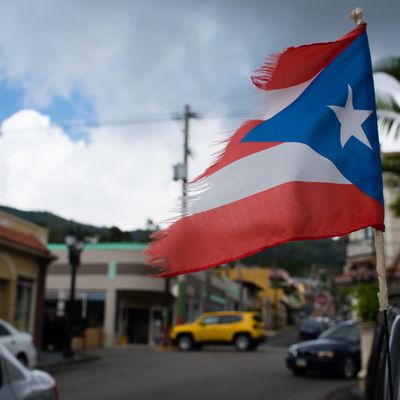
By the time Maria made landfall in Puerto Rico two years ago on the morning of September 20, the hurricane was downgraded to a category four, meaning it only whipped through the island with winds of up to 155 miles per hour. Within 48 hours, parts of the island had received almost 38 inches of rain; in total, the equivalent of six months of rain fell in less than four days. Most of the island’s 3.4 million people were left without power, as were the majority of the island’s hospitals. Almost two years later, the damage has been estimated at around $90 billion. An initial death toll of 64 was eventually revised to 2,982 fatalities, making the storm the third most deadly hurricane in U.S. history — though one Harvard study called its estimate of 4,645 dead “likely to be conservative.”
Around 2 p.m. on Wednesday, Tropical Storm Dorian is expected to make landfall on the southern coast of the island. Thankfully, it is much, much milder than Hurricane Maria, with max winds clocked around 50 miles per hour and anticipated rainfall of around six inches. Still, Puerto Rico has declared a state of emergency, and the National Hurricane Center has warned that the storm could be upgraded to a level-one hurricane by the time it reaches the island. With National Guard equipment mobilized at possible flash points, residents have been asked to “stay calm” and “take necessary precautions.” (The threat of Dorian on U.S. soil may not end at Puerto Rico’s shoreline either: One European forecasting model anticipated the storm could hit Florida somewhere between Jacksonville and West Palm Beach with hurricane force by Friday.)
However, Puerto Ricans will not be able to rely on a properly funded support effort from the Federal Emergency Management Agency. On Tuesday, FEMA and the Department of Homeland Security announced they would route $271 million to the southern border to support Immigration and Customs Enforcement. In response, Senate Minority Leader Chuck Schumer said: “The Trump administration’s plan to divert money away from FEMA at the start of hurricane season to continue its efforts to separate and jail migrant families is backwards and cruel.”
But the decision to move FEMA resources away from the coasts is just the latest example of how the administration limits funds for Puerto Rico, as the president continues to belittle its leaders and downplay Maria’s disastrous effects. (He has said that the storm was not a “real catastrophe like Katrina” and refused to acknowledge the updated death tolls.) On Tuesday, for at least the third time, the president repeated his erroneous claim that Puerto Rico has already received $92 billion in disaster relief:
In fact, Congress has only approved $42.3 billion in disaster funding; of that, only $12.6 billion has actually made it to Puerto Rico. (Trump’s $92 billion figure represents the number the island could receive over the next two decades.) According to one report from June, Trump delayed signing a relief bill for months that would aid disaster-stricken areas across the U.S. because it would also benefit Puerto Rico.
Ten days after the landfall of Hurricane Maria, when only 11 of the island’s 69 hospitals had power or working generators, San Juan Mayor Carmen Yulín Cruz condemned the administration in a press conference: “We are dying, and you are killing us with inefficiency and bureaucracy.” Her powerful assessment still holds almost two years later, as bridges and roads are still being repaired and residents recover from the emotional toil of physical and personal loss. As many as 30,000 families still have blue tarps as a roof, a particularly cruel example of government neglect considering that one FEMA tarp contractor working after the storm is currently under investigation for fraud.
Coming out of a political scandal that forced the resignation of Governor Ricardo Rosselló in July, the new administration may not be fully prepared to handle Dorian — if the damage is severe — just one month into its leadership. The economy, suffering a $90 billion loss just two years ago and semipermanently hampered by an unfavorable debt restructuring, certainly doesn’t need another hit. And though FEMA may not be able to properly respond to Dorian if necessary, the agency on Tuesday “urge[d] Puerto Rico residents to finish preparations” ahead of the storm.






























